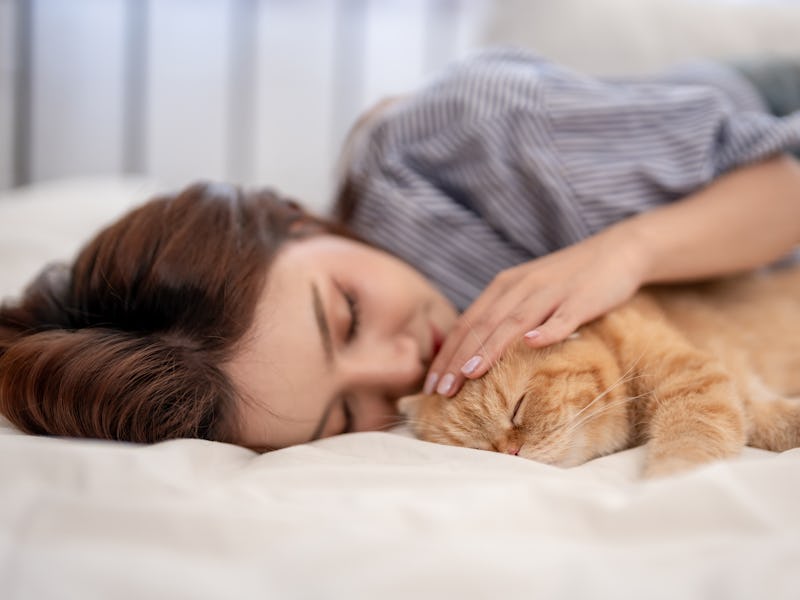Should Your Cat Sleep in Bed with You? A Veterinarian Reveals the Hidden Health Risks
Some people might be at a higher risk than others.

If you grew up sleeping with a stuffed animal tucked into the crook of your arm, you may have dreamed of the day that a real, live creature would take its place. But for those of you that are lucky enough to have a cat that wants to snuggle up next to you, is the practice actually a good idea?
Should your cat sleep with you?
Sharing your bed with your cat increases the risk of transmitting zoonotic diseases, which are ones that are transmissible from animals to humans. According to Calico Schmidt, a veterinarian and clinical instructor at the University of Wisconsin-Madison School of Veterinary Medicine, this is especially true if you have an outdoor cat.
“They might be a little more likely to pick up parasites like fleas and intestinal parasites,” Schmidt tells Inverse. “That doesn't mean that we shouldn't let them sleep with us, but it's a good reason for people whose cats go outdoors to make sure they see their veterinarian regularly and use preventive medications.” Schmidt also notes that immunocompromised people could be especially vulnerable to these sorts of infections since their bodies may not be fully prepared to fight whatever microorganisms enter.
But even indoor cats put their humans at an increased risk of different infections. Cats all use litter boxes, so just by walking around they’re spreading bacteria associated with their fecal matter. “That could be a potential risk too, just some of the bacteria they might bring from the litter box to an area like the bed or the pillow,” Schmidt says. She also says that young children whose immune systems are still developing are also at increased risk of infection, so it might be best to keep cats off their beds.
Cats tend to be more active at transitionary periods of daylight, like dawn and dusk. This is known as crepuscular behavior. That means that at sunrise, you could be dealing with a fairly active cat. “For some people, especially those who might be light sleepers, that might disrupt their sleep,” she says. For all we know about how important sleep is, you might not want to let your cat in bed with you if you know they’ll be trying to get a rise from you at sun-up.
When you should banish your cat from your bedroom
But at what point do you not only banish your cat from your bed, but from your bedroom? If you have severe asthma or cat allergies, then making your bedroom a feline-free space might benefit you in the long run. “We spend so much of our day sleeping that having that allergen-free space can be really good,” Schmidt says.
She herself is allergic to cats and has asthma, and has found a compromise with her three kitties. “They are not supposed to sleep with us, but we let them once a week,” she says. This compromise lets her feel that closeness to her felines that she craves without triggering her respiratory issues, though, of course, this might not work for everyone.
As long as you take the proper precautions and keep taking your cat to the vet, letting your cat sleep in bed with you can be a healthy part of your pet relationship, as Schmidt can attest. “I love my cats, and I think it is part of our bonding.”